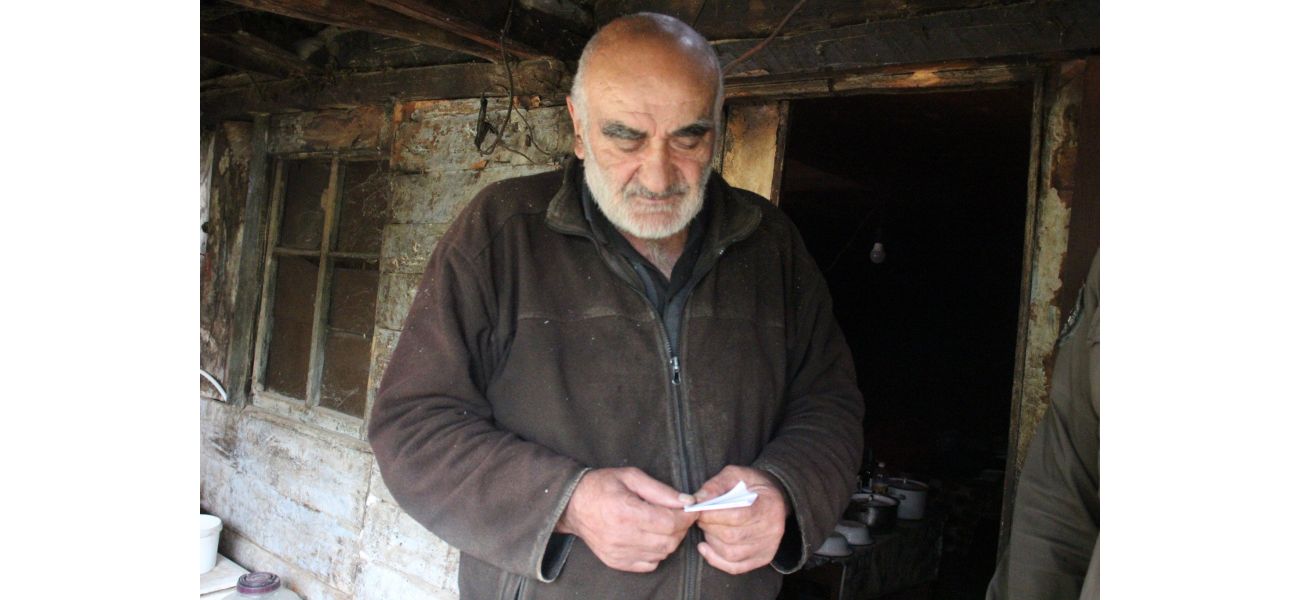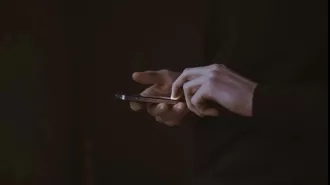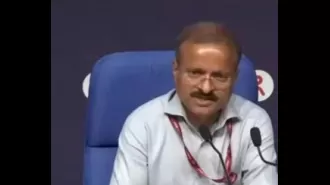Europe’s ‘zone of fear’ is a dangerous place where people risk being kidnapped or killed without any warning.
On the border of South Ossetia, a region under Russian occupation.
November 22nd 2024.

In a remote area on the border of South Ossetia, there is a sense of fear and uncertainty among the residents. Ever since Russia's invasion of Georgia in 2008, this region has been declared a 'zone of fear', where even the local police are hesitant to enter. This is the result of Russia's aggressive 'borderisation' process, which aims to establish control over the occupied territories of South Ossetia and Abkhazia.
Recently, our team from Metro travelled to this region alongside volunteers from Lifeline.ge, a Georgian project founded by David Katsarava and Egor Koruptev. We were on a mission to deliver much-needed humanitarian aid to several families in the area.
As we made our way to the villages of Abano, Koda, Bozhami, and Kirbali, it was evident that the tension and fear were palpable. Two police cars followed closely behind us, veering off onto dirt tracks as soon as we entered the 'zone of fear'. We were told that this was for our protection.
Our first stop was the village of Kirbali, where Katsarava informed us that approximately 90% of the residents had been abducted by Russian forces at some point. This was a sobering statistic and a reminder of the ongoing conflict and its impact on the local community.
Our team then met with a woman in the village, who remained anonymous. Katsarava greeted her in Georgian before handing her bags filled with essential supplies such as beans, rice, flour, and other non-perishables. As we entered her courtyard, we could see the remnants of her home, which had been destroyed by Russian soldiers 14 years ago. All that remained were the bases of the walls and some twisted metal rods poking out.
Katsarava warned us to be careful as the structure was unstable. This was a stark reminder of the unresolved struggle in the area. The woman's husband had been abducted by Russian soldiers when they set fire to their home, and she had been living in fear ever since.
This was a common story in the region, where many residents have been forced to leave their homes due to the ongoing conflict. Katsarava's anti-occupation movement 'Strength in Unity' has reported that at least 1,400 people have been taken since the 2008 war, but this number could not be confirmed by Metro.
The 'zone of fear' is a place where people live in constant danger, with frequent detentions and kidnappings occurring near the border with occupied South Ossetia. As we spoke with the locals, it became clear that they were deeply connected to their land and did not want to abandon their roots, despite the ongoing risks.
Katsarava explained that the Russian forces want to depopulate the region, making it easier for them to continue their creeping occupation. They often use fear and violence to achieve their goals, frequently detaining and kidnapping innocent civilians.
The length of the occupation line extends to 260 miles, but fences have only been erected on 44 miles. In some areas, the border is marked by signs or posts, but in others, it is a dangerous guessing game. This makes it difficult for people to know on which side of the border they are at times.
Katsarava also pointed out that many villagers mistakenly believe that more fencing will provide them with more protection from Russian soldiers. However, the reality is that most kidnappings occur when Russian troops cross into Georgian-controlled territory.
We then visited the home of Iura Kvinkadze, a refugee from Abkhazia who fled his homeland 30 years ago during the Russian-backed war between Abkhazia and Georgia. He showed us the makeshift shelter where he has been living for over half of his life, made of rough wooden logs with cracks that let the wind slip through.
Kvinkadze's story is a common one among the hundreds of thousands of Georgians who were forced to leave their homes during the conflict. Many of their properties were resettled by Abkhaz, Russians, and other groups, leaving them with no choice but to start over in a new place.
As our time in the 'zone of fear' came to an end, it was clear that the conflict and its consequences have had a devastating impact on the lives of the people living there. The fear, uncertainty, and struggle continue, but the residents remain resilient, determined to hold onto their land and their identity.
In the border region of South Ossetia, Georgia, a sense of fear and uncertainty permeates the air. This is due to Russia's aggressive tactic of "borderisation," in which they have declared a "zone of fear" along the border with the occupied territories of South Ossetia and Abkhazia. Even the Georgian police are too afraid to enter this zone.
Recently, Metro had the opportunity to travel to this region with volunteers from Lifeline.ge, a Georgian project founded by David Katsarava and Egor Koruptev. They were on a mission to deliver humanitarian aid to several families in need. The journey from Tbilisi, the capital of Georgia, took about an hour and a half to reach the villages of Abano, Koda, Bozhami, and Kirbali.
As soon as we entered the region, two police cars began following us closely, eventually veering off onto dirt tracks. Katsarava reassured us that this was for our protection. Our first stop was in the village of Kirbali, where Katsarava explained that around 90% of the residents have been abducted by Russian forces at some point.
Greeted by a woman in the Georgian language, Katsarava unloaded plastic bags filled with beans, rice, flour, and other non-perishable items from the trunk of his car. The woman's courtyard consisted of two buildings - a bungalow with a porch where red peppers were left to dry, and the remnants of a two-storey house that had been set on fire by Russian soldiers 14 years ago. Only the bases of the walls remained, with crumbling stones and twisted metal rods. Katsarava warned us to be careful, as the structure was unstable.
This was just one example of the ongoing struggle in this region. The woman had been forced to flee her home with her husband, who was abducted by Russian soldiers. After spending 10 months in prison, he was only released when his family paid a hefty "penalty."
Katsarava explained that this was a common occurrence in the area, where villagers are frequently detained and accused of crossing into South Ossetia. He also shared with us the tragic news that a friend of his, a veteran of the 2008 war, had been shot and killed by Russian border guards just a month prior. Another man had been kidnapped near the village of Sinaguri, and his fate was still unknown.
According to Katsarava's anti-occupation movement, "Strength in Unity," over 1,400 people have been taken since the 2008 war, although this number could not be confirmed by Metro. "This is terror," Katsarava stated, despite some experts describing the conflict as "frozen." He went on to explain that Russia's goal is to depopulate the region to make it easier for them to continue their creeping occupation.
The occupation line stretches for 260 miles, but fences have only been erected on 44 miles of it. In some areas, the border is marked by signs or posts, but in others, it is a dangerous guessing game. This makes it difficult for people to know which side they are on, and Katsarava believes that many villagers mistakenly think that more fencing means more protection from soldiers. However, the reality is that most kidnappings occur when Russian troops cross into Georgian-controlled territory.
We continued our journey to another house in Kirbali, which from a distance looked more like a makeshift shelter in the mountains. Up close, it was a haphazard assembly of rough-chopped wooden logs with cracks for the wind to seep through. This was the home of Iura Kvinkadze, a refugee from Abkhazia who fled his homeland 30 years ago during the Russian-backed war of 1992-1993.
Kvinkadze shared his story with us, explaining how he was forced to leave his home and property in the city of Ochamchira, on the Black Sea coast. He had lived there happily and self-sufficiently until Russian forces pushed him out in 1993. He has a son in Abkhazia, but they have no contact due to the ongoing conflict.
Kvinkadze has been living in the wooden hut for over 30 years, a constant reminder of the displacement and struggles he has faced. Like many others, he was forced to leave behind his home and community, which was later resettled by Abkhaz, Russians, and other groups. Katsarava explained that this is just one example of the genocide that Russia has carried out on Georgians in Abkhazia, causing unimaginable horrors for those who were forced to leave.
The situation in this region is dire, with villagers living in constant fear of abduction and violence. Katsarava and his team at Lifeline.ge continue to provide aid and support to these communities, as they refuse to abandon their roots and connection to the land. Despite the ongoing conflict and struggles, the resilience and determination of these people to fight for their homes and their rights are truly inspiring.
Recently, our team from Metro travelled to this region alongside volunteers from Lifeline.ge, a Georgian project founded by David Katsarava and Egor Koruptev. We were on a mission to deliver much-needed humanitarian aid to several families in the area.
As we made our way to the villages of Abano, Koda, Bozhami, and Kirbali, it was evident that the tension and fear were palpable. Two police cars followed closely behind us, veering off onto dirt tracks as soon as we entered the 'zone of fear'. We were told that this was for our protection.
Our first stop was the village of Kirbali, where Katsarava informed us that approximately 90% of the residents had been abducted by Russian forces at some point. This was a sobering statistic and a reminder of the ongoing conflict and its impact on the local community.
Our team then met with a woman in the village, who remained anonymous. Katsarava greeted her in Georgian before handing her bags filled with essential supplies such as beans, rice, flour, and other non-perishables. As we entered her courtyard, we could see the remnants of her home, which had been destroyed by Russian soldiers 14 years ago. All that remained were the bases of the walls and some twisted metal rods poking out.
Katsarava warned us to be careful as the structure was unstable. This was a stark reminder of the unresolved struggle in the area. The woman's husband had been abducted by Russian soldiers when they set fire to their home, and she had been living in fear ever since.
This was a common story in the region, where many residents have been forced to leave their homes due to the ongoing conflict. Katsarava's anti-occupation movement 'Strength in Unity' has reported that at least 1,400 people have been taken since the 2008 war, but this number could not be confirmed by Metro.
The 'zone of fear' is a place where people live in constant danger, with frequent detentions and kidnappings occurring near the border with occupied South Ossetia. As we spoke with the locals, it became clear that they were deeply connected to their land and did not want to abandon their roots, despite the ongoing risks.
Katsarava explained that the Russian forces want to depopulate the region, making it easier for them to continue their creeping occupation. They often use fear and violence to achieve their goals, frequently detaining and kidnapping innocent civilians.
The length of the occupation line extends to 260 miles, but fences have only been erected on 44 miles. In some areas, the border is marked by signs or posts, but in others, it is a dangerous guessing game. This makes it difficult for people to know on which side of the border they are at times.
Katsarava also pointed out that many villagers mistakenly believe that more fencing will provide them with more protection from Russian soldiers. However, the reality is that most kidnappings occur when Russian troops cross into Georgian-controlled territory.
We then visited the home of Iura Kvinkadze, a refugee from Abkhazia who fled his homeland 30 years ago during the Russian-backed war between Abkhazia and Georgia. He showed us the makeshift shelter where he has been living for over half of his life, made of rough wooden logs with cracks that let the wind slip through.
Kvinkadze's story is a common one among the hundreds of thousands of Georgians who were forced to leave their homes during the conflict. Many of their properties were resettled by Abkhaz, Russians, and other groups, leaving them with no choice but to start over in a new place.
As our time in the 'zone of fear' came to an end, it was clear that the conflict and its consequences have had a devastating impact on the lives of the people living there. The fear, uncertainty, and struggle continue, but the residents remain resilient, determined to hold onto their land and their identity.
In the border region of South Ossetia, Georgia, a sense of fear and uncertainty permeates the air. This is due to Russia's aggressive tactic of "borderisation," in which they have declared a "zone of fear" along the border with the occupied territories of South Ossetia and Abkhazia. Even the Georgian police are too afraid to enter this zone.
Recently, Metro had the opportunity to travel to this region with volunteers from Lifeline.ge, a Georgian project founded by David Katsarava and Egor Koruptev. They were on a mission to deliver humanitarian aid to several families in need. The journey from Tbilisi, the capital of Georgia, took about an hour and a half to reach the villages of Abano, Koda, Bozhami, and Kirbali.
As soon as we entered the region, two police cars began following us closely, eventually veering off onto dirt tracks. Katsarava reassured us that this was for our protection. Our first stop was in the village of Kirbali, where Katsarava explained that around 90% of the residents have been abducted by Russian forces at some point.
Greeted by a woman in the Georgian language, Katsarava unloaded plastic bags filled with beans, rice, flour, and other non-perishable items from the trunk of his car. The woman's courtyard consisted of two buildings - a bungalow with a porch where red peppers were left to dry, and the remnants of a two-storey house that had been set on fire by Russian soldiers 14 years ago. Only the bases of the walls remained, with crumbling stones and twisted metal rods. Katsarava warned us to be careful, as the structure was unstable.
This was just one example of the ongoing struggle in this region. The woman had been forced to flee her home with her husband, who was abducted by Russian soldiers. After spending 10 months in prison, he was only released when his family paid a hefty "penalty."
Katsarava explained that this was a common occurrence in the area, where villagers are frequently detained and accused of crossing into South Ossetia. He also shared with us the tragic news that a friend of his, a veteran of the 2008 war, had been shot and killed by Russian border guards just a month prior. Another man had been kidnapped near the village of Sinaguri, and his fate was still unknown.
According to Katsarava's anti-occupation movement, "Strength in Unity," over 1,400 people have been taken since the 2008 war, although this number could not be confirmed by Metro. "This is terror," Katsarava stated, despite some experts describing the conflict as "frozen." He went on to explain that Russia's goal is to depopulate the region to make it easier for them to continue their creeping occupation.
The occupation line stretches for 260 miles, but fences have only been erected on 44 miles of it. In some areas, the border is marked by signs or posts, but in others, it is a dangerous guessing game. This makes it difficult for people to know which side they are on, and Katsarava believes that many villagers mistakenly think that more fencing means more protection from soldiers. However, the reality is that most kidnappings occur when Russian troops cross into Georgian-controlled territory.
We continued our journey to another house in Kirbali, which from a distance looked more like a makeshift shelter in the mountains. Up close, it was a haphazard assembly of rough-chopped wooden logs with cracks for the wind to seep through. This was the home of Iura Kvinkadze, a refugee from Abkhazia who fled his homeland 30 years ago during the Russian-backed war of 1992-1993.
Kvinkadze shared his story with us, explaining how he was forced to leave his home and property in the city of Ochamchira, on the Black Sea coast. He had lived there happily and self-sufficiently until Russian forces pushed him out in 1993. He has a son in Abkhazia, but they have no contact due to the ongoing conflict.
Kvinkadze has been living in the wooden hut for over 30 years, a constant reminder of the displacement and struggles he has faced. Like many others, he was forced to leave behind his home and community, which was later resettled by Abkhaz, Russians, and other groups. Katsarava explained that this is just one example of the genocide that Russia has carried out on Georgians in Abkhazia, causing unimaginable horrors for those who were forced to leave.
The situation in this region is dire, with villagers living in constant fear of abduction and violence. Katsarava and his team at Lifeline.ge continue to provide aid and support to these communities, as they refuse to abandon their roots and connection to the land. Despite the ongoing conflict and struggles, the resilience and determination of these people to fight for their homes and their rights are truly inspiring.
[This article has been trending online recently and has been generated with AI. Your feed is customized.]
[Generative AI is experimental.]
0
0
Submit Comment





